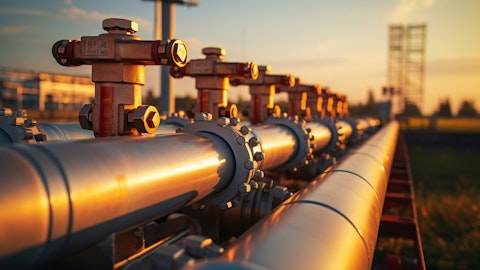UGI Corporation (NYSE:UGI) Q2 2024 Earnings Call Transcript May 2, 2024
UGI Corporation isn’t one of the 30 most popular stocks among hedge funds at the end of the third quarter (see the details here).
Operator: Good day, and thank you for standing by. Welcome to the UGI Corporation Q2 2024 Earnings Conference Call. At this time, all participants are in a listen-only mode. After the speaker’s presentation, there will be a question-and-answer session. [Operator Instructions] Please be advised that today’s conference is being recorded. I would now like to hand the conference over to your first speaker today, Tameka Morris, Senior Director of Investor Relations. Please go ahead.
Tameka Morris: Good morning, everyone. Thank you for joining our fiscal 2024 second quarter earnings call. With me today are Mario Longhi, Interim President and CEO; Sean O’Brienm CFO; and Bob Beard, COO. On today’s call we will provide a strategic update on the business and discuss our financial results for the quarter, before concluding with a question-and-answer session. Before we begin let me remind you that our comments today include certain forward-looking statements which management believes to be reasonable as of today’s date only. Actual results may differ significantly because of risks and uncertainties that are difficult to predict. Please read our earnings release and our most recent annual report for an extensive list of factors that could affect results.
We assume no duty to update or revise forward-looking statements to reflect events or circumstances that are different from expectations. We will also describe our business using certain non-GAAP financial measures. Reconciliations of these measures to the comparable GAAP measures are available within our presentation. Now I’m pleased to turn the call over to Mario.
Mario Longhi: Thank you, Tameka, and good morning, everyone. I’d like to begin by commenting on UGI’s second quarter and year-to-date financial results, before providing a broader strategic update. UGI had a strong fiscal 2024 second quarter, reporting adjusted earnings per share of $1.97, which was a $0.29 increase over the prior year. This performance reflects the resilience of our portfolio and the dedication of our people and was largely driven by the natural gas businesses. These natural gas businesses delivered record second quarter earnings, a 32% increase in adjusted net income over the prior year. We also implemented effective cost control across the enterprise and this resulted in a $27 million year-over-year reduction in operating and administrative expenses.
With a robust performance in the first half of the fiscal year, we are on track to deliver within our fiscal 2024 adjusted EPS guidance range of $2.70 to $3. We are also pleased to mark the 140th year of consecutively paying dividends, demonstrating our commitment to returning value to shareholders. Sean will provide further commentary on the financial performance shortly, but now I will pivot to the broader strategic update. As we announced yesterday, we completed the strategic review of the LPG businesses, primarily focused on AmeriGas, that was launched at the end of August 2023. The process was extensive and together with our financial advisers, we considered different scenarios including a potential sale, spin and joint venture of AmeriGas.
Although, we conducted a due diligence process with multiple strategic and financial parties, the Board decided that in the current market the company should focus on a restructuring and operational improvement plan for AmeriGas. The Board remains open to all opportunities to maximize shareholder value. Also in conjunction with the review, over the past few months, we have reassessed our operating strategy evaluated whether there are opportunities to change the way we work to achieve greater operational efficiencies and scrutinize how we allocate and prioritize capital. This assessment was based on our objective to create sustainable shareholder value by improving the earnings quality of our businesses to enable reliable earnings growth, strength in the balance sheet and prudently allocate capital.
As we move forward, we firmly believe that disciplined execution of our repositioned strategy will accomplish these objectives. We must operate as a high-performing customer-centered and results-driven organization, where we capitalize on our market-leading positions, optimize our strategically located assets and sustainably grow earnings through strong execution, effective cost control and disciplined capital deployment. It is clear to us that we have an attractive business portfolio. Our growth-oriented regulated utilities business operating constructive regulatory environments and have a long runway of investment opportunities that provide top-tier return on equity. Our Midstream & Marketing business holds LNG peaking facilities, natural gas and propane storage, gathering systems and pipeline assets that enable the business to sustain earnings growth, as evidenced in the second quarter results.
While these natural gas businesses continue to deliver strong results, we are committed to further optimizing their performance, holding the businesses to higher levels of operational excellence. Turning to the global LPG business. At UGI International, we have market-leading positions and strong brand loyalty in select markets, which supports our ability to achieve strong margins and attractive free cash flow generation. Similarly in the US, AmeriGas has a market-leading position in retail propane distribution in a highly competitive market. We must run that business differently and better to realize the benefits of that position. And so shortly, Bob will walk you through the basic approach to accomplish that objective. Moving forward, we will pursue opportunities to streamline our global LPG footprint and create more operational efficiencies.
And specifically at AmeriGas, we will share an overview of our plan to turn around that business with the intent to achieve stability and growth. Ultimately, through organic growth and continued investment, we intend to further shift the portfolio to become more predominantly the natural gas business in the future. And now, that takes me to four strategic actions culminating from the review and these strategic actions are. One, to pursue opportunities to enhance our portfolio and drive reliable earnings growth; two, stabilize and optimize AmeriGas; three, achieve operational efficiencies; and four, strengthen the balance sheet. Looking at our footprint. We operate in 18 countries in the US and Europe, as well as across several customer segments.
Within the portfolio, particularly in the LPG businesses, we will continue to explore options for the underperforming and less strategic areas or customer segments. As an example, in April, we entered into an agreement to divest of our LPG businesses in Switzerland, which service approximately 3,800 customers and we anticipate receiving net cash proceeds of approximately $27 million. Next, over the past few months, we have shared our intention to permanently reduce costs and strengthen the balance sheet. We have made clear progress in both areas as evidenced by a $16 million decline in our year-to-date operating expenses, as well as various financing and debt reduction actions taken in the past year. Those efforts will continue and the team will provide further insight shortly.
I will now hand the call to Bob, who was integrally involved in this strategic review. He will take the lead in implementing the action plan to stabilize and optimize AmeriGas.
Bob Beard: Thanks, Mario and good morning everyone. As you are aware, AmeriGas has encountered operational challenges over the past several years that have impacted our service standards, resulted in higher customer attrition rates and placed significant pressure on our debt covenants. The strategic review helped us better frame the weaknesses in our operating model. While these challenges are not new and you’ve heard us discuss several of them over time, the strategic review identified a level of detail that was necessary for us to formulate a more comprehensive and effective action plan to address those shortcomings. We gained more clarity on what needs to be done, and we’re committed to doing it. Our overall focus will be on improving our performance in customer satisfaction, service reliability and overall operational excellence.
We are committed to addressing these challenges. To initiate this journey, we have streamlined our operational model, creating a simpler and more focused model that enables us to anticipate and more effectively address the evolving needs of our customers. While there are many key indicators associated with measuring these continued operational improvements, the ultimate measure of our success will be the financial results of the business. To support this overarching goal, we’re actively pursuing efficiency measures to ensure that our cost structure remains aligned with the earnings trajectory of the business. In line with this objective, we have initiated permanent cost reduction measures that do not compromise our operational capabilities.

A number of these actions were completed in late April 2024. Next, as Mario shared, we remain open to opportunities to streamline our footprint and focus on core customer segments. Also of importance, we are working to adjust our capital structure and address AmeriGas’ balance sheet, which is currently constrained. Sean will speak to the progress we’ve made and additional actions that will be taken in the near term. Overall, with diligent execution of our new operating strategy and a renewed commitment to our values, we anticipate that AmeriGas will begin to see stability in its operating performance and resume being a cash contributor to UGI by fiscal 2026. And now I’ll hand the call over to Sean.
Sean O’Brien: Thanks, Bob, and good morning. First, I will provide my comments on the performance for the quarter before turning to the midterm outlook for UGI. As Mario mentioned, for the fiscal 2024 second quarter, UGI delivered adjusted diluted EPS of $1.97 in comparison to $1.68 in the prior year period. The utility segment was up $0.06, largely due to higher gas rates in both Pennsylvania and West Virginia as well as higher electric rates that were implemented during the fiscal year. Midstream & Marketing was up $0.25, as the business realized higher margins from natural gas marketing activities and the effect of investment tax credits on completed RNG projects. UGI International was down $0.01 from lower earnings attributable to the noncore energy marketing business, and this was partially offset by higher LPG unit margins and lower operating and administrative expenses.
AmeriGas was down $0.17, predominantly due to higher income taxes resulting from limitations on interest deductibility. Lastly, Corporate & Other was up $0.16, where tax benefits were realized, offsetting the effects of the tax headwind faced at AmeriGas. While there was variability in the segment-level tax expense, UGI’s annual effective tax rate is expected to be slightly lower than prior year. Turning to the next slide. I now will walk you through the key drivers for each reportable segment when compared to the prior year. At the utility segment, EBIT was $226 million for the fiscal second quarter, up $21 million over the prior year period. We saw a modest increase in core market volumes with weather for the quarter being 5% colder than the prior year.
Utilities realized an increase of $25 million in total margins due to higher gas and electric base rates, incremental benefits from the DISC program as well as continued customer growth. The business continues to expand its customer base and added more than 3,000 new residential heating and commercial customers during the quarter. Operating and administrative expenses were comparable with the prior year, as lower uncollectible account expense and contract labor costs were largely offset by higher employee benefit expense. There was also increased depreciation and amortization expense with the continued investment in the distribution system. On a year-to-date basis, we invested roughly $170 million at the regulated utilities, primarily in replacing aging infrastructure.
Next, Midstream & Marketing reported EBIT of $153 million, a $48 million increase over the prior year. Total margin was up $41 million on higher margins from natural gas marketing activities including the effects of peaking and capacity management margins. Operating and administrative expenses were down $6 million due to lower salary and benefits as well as maintenance expenses. At UGI International EBIT was $131 million, up $3 million on a year-over-year basis. LPG volumes were comparable to the prior year as the effect of warmer weather was offset by natural gas to LPG conversions and higher auto gas volumes sold. Total margin was down $10 million driven by lower margin as we exit the non-core energy marketing business. This was partially offset by higher LPG unit margins and the translation effect of stronger foreign currencies amounting to approximately $5 million.
Operating and administrative expenses were down $16 million due to lower personnel and maintenance costs, partially offset by the translation effects of the stronger foreign currencies. Lastly, at AmeriGas, EBIT was comparable with prior year as reductions in total margin were offset by reduced operating and administrative expenses. For the quarter, we saw warmer weather, which when coupled with customer loss led to a 6% reduction in retail volumes over the prior year. There was a modest increase in cylinder exchange volumes and a slight reduction in national accounts with lower usage in the railroad customer segment. The effects of lower volumes were partially offset by higher LPG unit markets leading to a $4 million reduction in total margin when compared to the prior year.
Operating and administrative expenses were down $5 million, reflecting among other things lower compensation and advertising expenses, partially offset by higher vehicle expenses. Moving to liquidity. At the end of the quarter UGI had available liquidity of $1.7 billion, inclusive of cash and cash equivalents and available borrowing capacity on our revolving credit facilities. During the quarter, we executed $38 million of open market bond repurchases at AmeriGas and the business ended the period with approximately $100 million of cash on hand. Since the beginning of fiscal 2023, we have reduced absolute debt at AmeriGas by approximately $340 million, executing on our objective to strengthen and provide more buffer on the credit metrics. During the back half of fiscal 2024, our goal is to reduce debt by another $350 million to $450 million, using both, free cash flow generated from AmeriGas, and between $200 million to $300 million of parental contribution.
As Bob mentioned, he is spearheading the action to stabilize and optimize AmeriGas. To support those actions, we will pursue options to address the revolver that while undrawn has restricted debt covenants. This will enable the business to work through the planned operational improvements without quarterly covenant compliance pressures. As I pivot to our outlook, let me briefly remind you of our core financial objectives that Mario shared at the onset. Our objectives are to improve the earnings quality of our business and deliver reliable earnings growth, strengthen the balance sheet and be disciplined in how we allocate capital, which will facilitate sustainable shareholder value creation. Starting with our fiscal 2024 guidance. For the fiscal year-to-date, UGI has delivered $3.16 of adjusted EPS led by increased margins from natural gas marketing activities in the US, higher base rates at the regulated utilities, increased LPG volumes and unit margins at UGI International, and lower operating and administrative expenses across the enterprise.
These benefits were partially offset by the effects of warmer weather in the LPG businesses and reduced total margins at AmeriGas Propane. We are pleased with the strong start to the year. Based on the cyclical nature of the business and our earnings projection for the back half of the year, we are holding our fiscal 2024 adjusted EPS guidance range of $2.70 to $3. Now this slide summarizes several financial targets between fiscal 2024 and to 2027. Over that period, we are targeting a 4% to 6% EPS growth rate. Fiscal 2025 and 2026 will be rebuilding years where we continue to execute the strategy that was previously outlined. We anticipate investing capital of approximately $3.9 billion across UGI during that period. A primary driver of the targeted EPS growth is our planned investment of approximately $2.6 billion at the regulated utilities, which will facilitate 9%-plus rate base growth, as well as organic growth throughout the remaining portfolio.
As I’ll address shortly, the outlook does not include incremental debt, we anticipate that UGI will achieve its targeted leverage ratio during the plan period. As we shared previously, our team is focused on increasing efficiencies and lowering our operating costs. We are on track to deliver the targeted permanent cost savings of $70 million to $100 million by the end of fiscal 2025 using fiscal 2023 as the base year. We have line of sight into the labor and non-labor actions required to achieve these targets and we’ve already executed on actions that are intended to deliver those savings projected for fiscal 2024. On a fiscal year-to-date basis these measures have already contributed to the $16 million reduction in total OpEx when compared to the prior year.
Turning to capital allocation. We will continue to apply a disciplined framework where we prioritize returns to shareholders actions that will strengthen the balance sheet and improve financial flexibility and invest in areas with the highest potential returns to our shareholders, which will also benefit our customers. On the next two slides, I’ll comment on our outlook through to fiscal 2027 as we adhere to this framework. UGI has a long track record of paying dividends. As we balance our priorities over the next two years, we remain committed to preserving that history. Between fiscal 2024 and 2026 as we focus on strengthening the balance sheet and stabilizing AmeriGas, we expect that dividends will stay flat, while still achieving a payout ratio close to 50%.
Now as we move to fiscal 2027, we anticipate returning to our targeted 4% dividend growth rate over the long term. Slide 21 walks you through our targeted cash deployment plan for fiscal 2024 through to 2027, which aligns with the priorities that we shared previously. The plan will be fully funded by cash flow from operations as we do not anticipate any additional equity needs, while reducing absolute debt for UGI. In addition of the roughly $3.9 billion in capital expenditures, approximately 85% will be invested in our natural gas businesses predominantly in our regulated utilities where we have ample opportunities to deploy growth capital. And with that I’ll hand the call back over to Mario.
Mario Longhi: Thanks Sean. As I close, I want to emphasize our conviction that diligent execution of the fundamentals will enable UGI to build a strong momentum of balanced growth and value creation. We have embarked on that journey and are taking the necessary actions to achieve the financial commitments that we have outlined. We have the financial capacity to maintain investments in the natural gas businesses particularly in the regulated utilities, which are expected to deliver 9% plus in rate base growth. These businesses provide strong return and benefit from the free cash flow-generating LPG businesses. With this model between fiscal 2024 and 2027, we will target a 4% to 6% EPS growth rate and leverage ratio between 3.5 to 4 times.
We will also preserve our commitment to the dividend, which has been synonymous with our brand over the past 140 years, keeping the amount flat through fiscal 2026. Our intent is to return to a long-term dividend growth rate of 4% in fiscal 2027. I thank you for your continued interest and support of UGI. And I’ll now turn the call back to our operator to open the line for questions.
See also 12 Most Profitable Dividend Stocks To Invest In and 15 Fastest Rising Universities in the US.
Q&A Session
Follow Ugi Corp (NYSE:UGI)
Follow Ugi Corp (NYSE:UGI)
Receive real-time insider trading and news alerts
Operator: Thank you. At this time, we will conduct the question-and-answer session. [Operator Instructions] Our first question comes from the line of Christopher Jeffrey of Mizuho Securities. Your line is now open.
Christopher Jeffrey: Hi, everyone. Good morning. Maybe just starting with the around $400 million of debt reduction at AmeriGas. Just kind of curious what the approach will be to accomplishing that. How much is involved with internally generated cash flows at AmeriGas versus doing something more external intervention?
Sean O’Brien: Yeah. Good morning, Chris. This is Sean. I can hit that. Maybe I’ll take you back historically. We took about $300 million out last year. AmeriGas contributed somewhere around $20 million, $30 million of that last year. As we look at this year, first and foremost, we were able to take almost $40 million out through the OMR repurchases that we did in Q3. That was all with AmeriGas cash. So that $40 million came from AmeriGas. As we look to the back half of the year and our goal to continue to improve the balance sheet, we see AmeriGas cash providing maybe another $150 million of debt reduction, and then another maybe $200 million to $300 million from Corp. And that should get you to that total that we’re looking for.
One thing to keep in mind, as we achieve all this, we’ll have taken over $700 million of AmeriGas debt off the balance sheet. So, we’re pretty proud of that. But directly to answer your question, you’re looking at about $200 million coming from AmeriGas cash and another $200 million or so coming from a corporate injection.
Christopher Jeffrey: Got it. And maybe just to clarify that coming from the Corp., is that just cash on hand? Or would that be involved with the asset sales that you’ve mentioned? Or…
Sean O’Brien: Yeah, all of the above. So we’re also optimizing the structure. Obviously, that cash can be more optimally raised or utilized from corporate fungibility. But we also — as Mario mentioned, we had a $27 million asset sale. I think if you listen to the remarks that Mario made, we’re continuing to look at the portfolio and opportunities to generate cash through some potential asset sales. So all of the above. And the good news is we’ve already executed on almost $30 million of an asset sale that will contribute to that cash coming down.
Christopher Jeffrey: Got it. Great. And then maybe just last one on this as far as options to kind of adjust fee revolver at AmeriGas, as you mentioned. Any early insights into that?
Sean O’Brien: Yeah. I think a couple of things. You heard Bob and Mario lay out a plan to get to stabilize and optimize AmeriGas. We want to be able to buy some time. So we are looking pretty heavily at removing but replacing the revolver with another instrument that does not have a quarterly covenant that puts us under that quarterly pressure. It gives us some time as we work through this turnaround and gives us time to basically execute on the things we want to without having that quarterly pressure on AmeriGas and probably more importantly, on corporate as well. So we have started down that path. We have some strategies that we’ve been working on for a little while. And we’ll keep you abreast, but I’m hopeful that we could be successful.
Christopher Jeffrey: Maybe, Sean, and if I could just squeeze one last one, just the 4% to 6% growth rate. Should we be thinking about that as kind of the CAGR from 2024 to 2027? Are you looking at like kind of midpoint of guidance? Anything in particular as far as base?
Sean O’Brien: Yeah. I think it’s yes to most of that. I mean it is a 2024 to 2027, Chris. I think the way to think about that 4% to 6% is we’re in a period of balance sheet repair. We’re in a period of being very disciplined with capital. So that’s why that range came down a little bit, I think, from historical for the company. But it is that period. We feel comfortable. On one side of the fence, we have businesses growing quite a bit. You’ve got 9% rate base growth. You got nat gas performing really well. So, we do think of it as trying to — we’ve got a midpoint in there, but it is 2024 to 2027.
Christopher Jeffrey: Great. Thank you. Congratulations on the announcement and all the help throughout the process.
Operator: Okay. Thank you for your question. [Operator Instructions] One moment for our next question. Our next question comes from the line of Paul Fremont of Ladenburg. Your line is now open.
Paul Fremont: Thank you very much. I guess my question relates to the Midstream & Marketing. So if total margin is up $41 million and Marketing is $46 million, can you just walk us through what would be sort of the — what the chart would look like if it was just Midstream and what the sort of comparator would look like?
Sean O’Brien: Yes, Paul. This is Sean. A couple of things. I think you’re looking at a big increase. The drivers the biggest driver I think as we tried to allude is capacity values on our — we’ve got basis differentials on the gas pipelines that we’ve contract and we saw some pretty good spreads on the basis. So we were able to take advantage of those contracts, those capacity contracts. And that drove a significant portion of the value. I think the other piece to consider is, we have a storage business. If you look at this year that storage business, was in the black and last year based on the timing of the contracts, we lost money. So that’s one of the bigger drivers as well. You had a loss sitting in 2023 and you had a modest earnings this year.
Those are the two biggest drivers of that $48 million. I know you, didn’t ask about it, but the other highlight would be that OpEx across the company. We see operating costs coming down. There’s a pretty big focus on that. And the Midstream business contributed to that goal as well. So hopefully, that answers your question, but those are the drivers of what is happening in the Energy Services business.
Paul Fremont: Okay. I guess, I’m still not understanding. So was Midstream up, quarter-over-quarter by itself, if you exclude Marketing from the picture?
Sean O’Brien: If you exclude Marketing from the picture, Midstream was up quarter-over-quarter, yes.
Paul Fremont: And by how much?
Sean O’Brien: It’s going to be a much — the majority of the gain was the Marketing side of the equation. So, it’s going to be less than $10 million.
Paul Fremont: Okay. And then, I guess one of your peers seem to experience, a significant uplift in storage margins during the quarter. Did you experience any significant changes, in storage margins?





